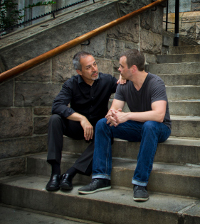|
|
 |
| RECEIVING PRESENTS FROM HIM -- (L-R) Alfredo Diaz, Joe Capozzi, David G. Beck. Photo by Benny Cuppini. |
Capozzi met Fr. Pete when he was eight years old, when his very inviting family began inviting him over for dinner when Capozzi's father met him in the local volunteer fire department. Though Capozzi initially had instinctually been "creeped out" by the priest's demeanor, he eventually let his guard down enough to spend time alone with Pete, eventually receiving gifts from him and even going away on weekend trips together. The abuse began when he was between the ages of sixteen and seventeen, and continued on and off for the next ten years. The two would drink together, and after given "aspirin" by the priest for hangover suppression, Capozzi would fall unconscious, waking the next morning with little to no recollection of the previous evenings occurrences After years of dealing with the abuse privately, impacting Capozzi's life negatively as he went in and out of therapy, he finally came forward 2005 when he saw the cycle begin again with the younger generation at his local church.
Pete was still a family friend years after Capozzi had "avoided physical instances." The priest even presided over Capozzi's marriage. However, his older brother and those he grew up with had begun families and as their children grew, Capozzi began to notice familiar patterns in Pete's relationship with their children. The patterns were evident in gifts for a family friend's son, a young boy, James. When Capozzi began noticing these gifts and Pete's commenting on the boys physique, he finally made the decision to come forward. By this point, he was at the end of his rope, feeling "suicidal" just coming off of a divorce and feeling particularly vulnerable. The first step, Capozzi decided was to confront Pete. He sent the priest an email that read bluntly, "I remember everything. Stay away from my family."
The next step for Capozzi was to tell his parents. Upon telling them however, he was faced with their anger and the questions of how and why he let it go on for so long.
"When I told my parents about what happened to me they were initially mad at me," he says. "People always ask people who've been abused, 'Why do you stay in it?' All the questions of 'why' seem to be put on the person who the bad thing happened to. There are so many reasons why." Capozzi cites his low self-esteem as an adolescent and the validation he received from the priest's positive attention and being told how "special" he was.
"I was way too sensitive and way too emotional and I felt like I had one person who believed in me. Even though he was a bad man doing bad things to me I was like 'Fuck it, I don't have anything else I'll take it from him.' It's a very sick way to think about things but that's the reason I wrote the play," he confesses. He wrote to try to understand what went on his own mind and the mind of his molester.
"What goes on in the mind of someone who knows something bad is happening to them, knows that this is a bad relationship but stays in it," he reveals of the overarching inspiration of the piece.
Fortunately, though their initial reaction was negative, it didn't take long for Capozzi's parents to begin to understand their son's circumstances. Since then, Capozzi enforces that they've been a "huge and vital support" in his life.
The support of family and friends, therapy, and acting classes all facilitated the writing of "For Pete's Sake." Though therapy had failed to bring Capozzi to any major closure in the past, the implementation by one of his therapists of a journal began his journey to honesty. Six or seven pages of the journal helped in to identify specific instances of the abuse and how Capozzi felt about them. In May 2008, he began constructing the source material into a play and held a reading of it the following December.
 |
| PETE AND JOE -- (L-R): Jorge Humberto Hoyos (as Pete), Joe Capozzi (as Joe). Photo by Benny Cuppini |
The journals contained Capozzi's thoughts on dealing with the negative impact that the abuse truly had on his life. These thoughts and emotions are personified in two characters who represent the hopeful voice and negative voice Capozzi grappled with throughout his life. The voices are a constant presence throughout the play, bickering over how to deal with the traumatic experiences in his life.
"There's the critic in your head. The bully, the mean one. The one who puts you down. That voice in my head is the one that keeps you from going after things by saying you can't or you're not good enough," Capozzi explains.
"The voice of hope keeps you alive. Stops you from throwing yourself in front of a subway train." At whatever point he was in his life he believes the negative voice can be stronger than hope, but hope still clings on. Eventually, in his case, the more positive voice rang out, convincing him to tell his story to his family, to his friends, and finally, to his audience.
Capozzi wanted to be especially vocal about his story because in some ways, he knew how the church would react.
"I had no faith that the church was going to do the right thing because I had been following the news, and how they would deny and get away and how they would be able to not accept responsibility. They would make the person coming forward seem like they were being untruthful or crazy," he explains.
Because of this awareness, Capozzi contacted whoever he could in order to put the awareness in peoples mind. "I wanted the truth to come out and I wanted him to know that I knew and that I remembered everything."
"It's not about religion, it's not about politics. It's
about not placing the blame on the victim," Capozzi reveals.
If an audience member would walk in blaming the victim and have
their perspective broadened by the piece, he would feel he did
his job. "It's about humanity, the weakness we all have and
to help understand why these things happen and how they affect
the victim and its family."
Starr
Films and Snowball's Chance Productions presents "For Pete's
Sake"
September 27 to October 14, 2012
Fourth Street Theater, 83 East Fourth Street (E. Village, NYC)
Wed-Sat at 7:30 PM, Sun at 3:00 PM
$25 at the door, $21 in advance
Box office: (800) 838-3006, http://www.brownpapertickets.com
Show's website: www.forpetessaketheplay.com
| museums | NYTW mail | recordings | coupons | publications | classified |

